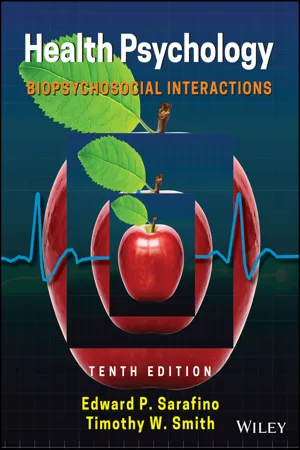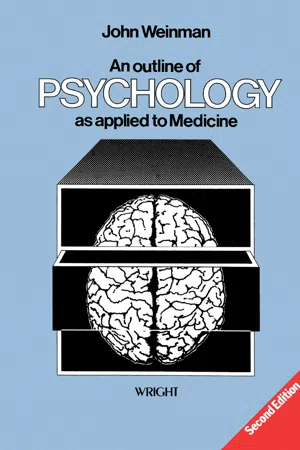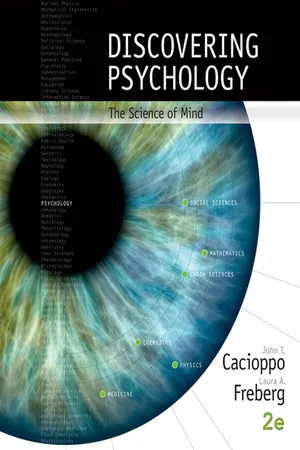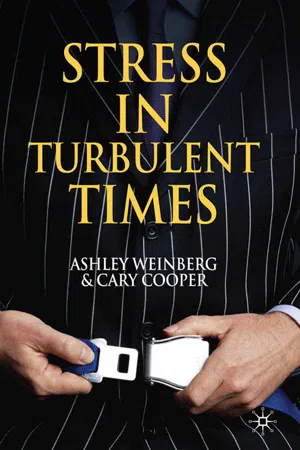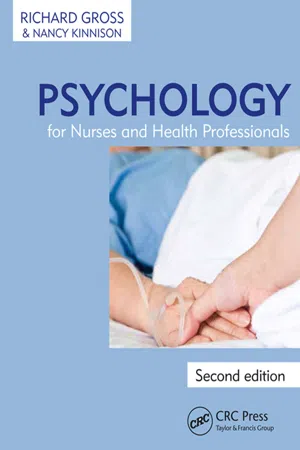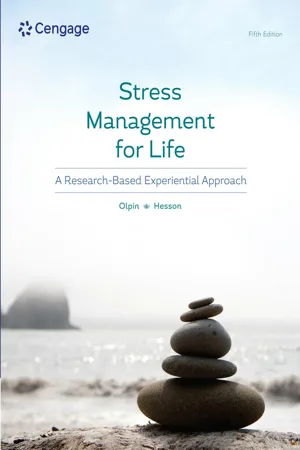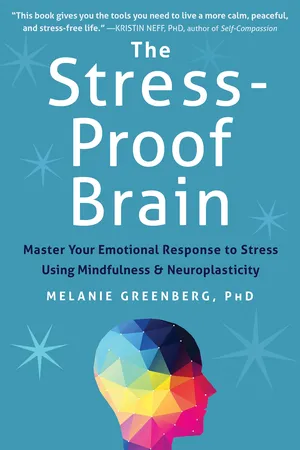Psychology
Stress
Stress refers to the body's response to a demand or challenge, often resulting in feelings of pressure, tension, and anxiety. It can be triggered by various factors, such as environmental changes, work demands, or personal relationships. Chronic stress can have negative effects on both physical and mental health, leading to conditions like anxiety disorders and depression.
Written by Perlego with AI-assistance
Related key terms
1 of 5
12 Key excerpts on "Stress"
- eBook - PDF
Health Psychology
Biopsychosocial Interactions
- Edward P. Sarafino, Timothy W. Smith(Authors)
- 2021(Publication Date)
- Wiley(Publisher)
Usually the statement means they feel unable to deal with the demands of their environment, and they feel tense and uncomfortable. Because of the pervasiveness and com- monality of these experiences in our lives, you might expect that defining the concept of Stress would be simple. But it isn’t. Let’s see how psychologists have conceptualized Stress and what the prevailing defini- tion is today. WHAT IS Stress? The condition of Stress has two components: physical, involving direct material or bodily challenge, and psy- chological, involving how individuals perceive circum- stances in their lives (Lovallo, 2005). These components can be examined in three ways (Dougall & Baum, 2012). One approach focuses on the environment: Stress is seen as a stimulus, as when we have a demanding job or experience severe pain from arthritis or a death in the family. Physically or psychologically challenging events or circumstances are called Stressors. The second approach treats Stress as a response, focusing on peo- ple’s reactions to Stressors. We see an example of this approach when people use the word Stress to refer to their state of tension. Our responses can be psycho- logical, such as your thoughts and emotions when you “feel nervous,” and physiological, as when your heart pounds, your mouth goes dry, and you perspire. The psychological and physiological response to a Stressor is called strain. The third approach describes Stress as a process that includes Stressors and strains, but adds an important dimension: the relationship between the person and environment (Lazarus, 1999; Lazarus & Folkman, 1984). This process involves continuous interactions and adjustments—called transactions—with the person and environment each affecting and being affected by the other. - eBook - PDF
- Catherine A. Sanderson, Karen R. Huffman(Authors)
- 2019(Publication Date)
- Wiley(Publisher)
Next we explore how we cope with Stress, and then close with a discussion of the field of health psychology. Did you know that the latest APA annual Stress report found that people currently between the ages of 15 and 21 are the most likely of all generations to report poor mental health (American Psychological Association, 2018)? This report also revealed that high-profile issues, like gun violence and sexual harassment, were among the most significant factors associated with this high level of Stress. Everyone experiences Stress, and we generally know what a person means when he or she speaks of being “Stressed.” But scientists typically define Stress as the interpretation of specific events, called Stressors, as threatening or challenging. The resulting physical and psychological reactions to Stressors are known as the Stress response (Becker & Rohleder, 2019; Sanderson, 2013; Selye, 1936, 1983). Using these definitions, can you see how the gun violence and sexual harassment problems listed above would be called Stressors, whereas their physical and psychological reactions would be their Stress response? In this section, we’ll discuss the key sources of Stress and how it affects us. Before going on, test your general knowledge of Stress and health in the Test Yourself. Stress The interpretation of specific events, called Stressors, as threatening or challenging; the physical and psychological reac- tions to Stressors are known as the Stress response. Stressor A trigger or stimulus that induces Stress. Sources of Stress Although literally hundreds of things can cause Stress in all of our lives, psychological science has focused on seven major sources (Figure 3.1). Understanding Stress 75 Life Changes Early Stress researchers Thomas Holmes and Richard Rahe (1967) believed that any life change that required some adjustment in behavior or lifestyle could cause some degree of Stress. - John Weinman(Author)
- 2013(Publication Date)
- Butterworth-Heinemann(Publisher)
5 Stress, emotion and illness It is not uncommon to hear patients say that they feel their illness has been brought on by Stress in their lives. What they usually mean by this is that they have been under a certain amount of pressure at home or at work and that this has affected them mentally or physically. Doctors, too, may report that certain symptoms or illnesses are triggered or exacerbated by Stress factors. What is really meant by such statements? Is it possible to characterize Stressful situations and how can psychosocial pressure have an adverse effect on bodily processes? As we shall see, the answers to these questions are complex and, as yet, very incomplete. One fundamental problem lies with the use of the term 'Stress' since it can be taken to refer not only to aspects of the environment but also to the individual's behaviour and to underlying physiological responses. As Lader (1979) has accurately observed, Stress has become 'a convenient non-technical shorthand term which communicates our ignorance, not our knowledge'. In view of these conceptual problems, a major aim of this chapter is to examine what is meant by the term 'Stress'. The concept of Stress is discussed and some of the related physiological and psychological responses are described. Following this there is an outline of the relation between the psychological and physiological aspects of the emotional changes in response to a Stressor. Finally, these findings are used as a basis for discussing the way in which Stress factors might be associated with illness. • 5.1. The nature of Stress a. Stress: what is it? One of the primary problems with the term 'Stress' is that it is used in a number of quite different ways. Thus it can be used to describe various unpleasant situations or events which are considered to be Stressful. Alternatively, it may be used to describe the behavioural or physiological responses which occur when an individual is confronted by an unpleasant situation or Stressor.- eBook - PDF
Discovering Psychology
The Science of Mind
- John Cacioppo, Laura Freberg(Authors)
- 2015(Publication Date)
- Cengage Learning EMEA(Publisher)
Cengage Learning reserves the right to remove additional content at any time if subsequent rights restrictions require it. 620 Learning Objectives 1. Define Stress, identifying key neural and hormonal aspects of Hans Selye’s general adaptation syndrome. 2. Distinguish among adaptive elements of the short-term Stress response with health problems linked to chronic Stress. 3. Compare and contrast strategies for coping with Stress, including problem-, emotion-, and relationship-focused strategies. 4. Summarize the psychosocial factors associated with smoking, nutrition, alcohol use, and lack of exercise, and propose a behavioral interventions for these problems. 5. Differentiate the aims and principles of positive psychology from those of other major movements in psychology, as described in Chapter 1. 6. Distinguish among meanings of happiness (pleasant, good, and meaningful lives), and analyze the research evidence on what makes people happy. What Is Stress? College students rarely need much introduction to the concept of Stress. They are no strangers to the Stress that accompanies worrying about assignments and grades, money matters, world affairs, and relationships. Stress is an unpleasant emotional state that results from the percep-tion of danger. The source of Stress is called a Stressor . The key to our definition is the word perception. No one set of Stressors reliably produces Stress in everybody. People’s Stressors are highly individual and idiosyncratic. The object of one person’s phobia may be another person’s beloved, although scaly and slithery, pet. Regard-less of the Stressor responsible for feelings of Stress, once people perceive that they are in some kind of danger, a common and predictable set of responses to the Stressor is set in motion. Psychologists have identified positive outcomes of our responses to Stress (Selye, 1975). - No longer available |Learn more
Organizational Stress
A Review and Critique of Theory, Research, and Applications
- Cary L. Cooper, Philip J. Dewe, Michael P. O'Driscoll, Michael P. O′Driscoll(Authors)
- 2001(Publication Date)
- SAGE Publications, Inc(Publisher)
As has already been noted, Stress has been defined as a stimulus, a response, or the result of an interaction between the two, with the interaction described in terms of some imbalance between the person and the environment (Cox, 1978). As empirical knowledge has developed, particularly that surrounding the person-environment (P-E) interaction, researchers have considered the nature of that interaction and, more importantly, the psychological processes through which it takes place (Dewe, 1992). From this debate has emerged a belief that traditional approaches to defining Stress (i.e., stimulus, response, interaction) have, by directing attention toward external events, diverted researchers away from considering the processes within the individual through which such events are appraised (Duckworth, 1986). This is not to say that such ideas have gone unresearched or that earlier definitional approaches are necessarily inadequate. However, as knowledge and understanding of stimulus, response, and interaction definitions and their associated meaning have advanced, the debate about how Stress should be defined has shifted ground. Rather than singling out and focusing separately on the different elements of the Stress process, we suggest that it is now time to examine more comprehensively the nature of that process itself and to integrate stimulus and response definitions within an overall conceptual framework that acknowledges the dynamic linkages between all elements of the Stress process. Contemporary views on how Stress should be defined require researchers to think of Stress as being relational (Lazarus & Launier, 1978): the result of a transaction between the individual and the environment (Lazarus, 1990). The transactional approach draws researchers toward identifying those processes that link the individual to the environment - eBook - PDF
- Douglas Bernstein, , , (Authors)
- 2015(Publication Date)
- Cengage Learning EMEA(Publisher)
UNDERSTANDING Stress AND StressORS How do psychological Stressors affect physical health? You have probably heard that death and taxes are the only two things guaranteed in life. If there is a third, it surely must be Stress. Stress is woven into the fabric of life. No mat-ter how wealthy, powerful, attractive, or happy you might be, Stress happens. It comes in many forms: a difficult exam, an automobile accident, a trauma of some kind, standing in a long line, reading about frightening world events, or just having a day when everything goes wrong. Some Stress experiences, such as waiting to be with that special person, can be stimulating, motivating, and even desirable, but when circumstances begin to exceed our ability to cope with them, the result can be Stress that creates physical, psychological, and behavioral problems. Stress in the workplace, for example, costs U.S. businesses more than $150 billion each year due to employee absenteeism, reduced productivity, and health care costs (Chandola, Brunner, & Marmot, 2006; Schwartz, 2004). Stress is the negative emotional and physiological process that occurs as individuals try to adjust to or deal with Stressors. Stressors , in turn, are events and situations (such as exams or accidents) that disrupt or threaten to disrupt a person’s daily functioning and sense of well-being. Stress reactions are the physical, psychological, and behavioral responses (such as nausea, anxiety, or avoidance) that occur in the face of Stressors (Taylor, 2002). Some of us are more strongly affected by Stressors than others, and we may be more strongly affected on some occasions than on others. Why? As described in more de-tail later, several mediating factors influence the relationship between people and their Stress The process of adjusting to circumstances that disrupt or threaten to disrupt a person’s daily functioning. Stressors Events or situations to which people must adjust. - eBook - PDF
- A. Weinberg, C. Cooper(Authors)
- 2011(Publication Date)
- Palgrave Macmillan(Publisher)
39 CHAPTER 3 The natur e of st r ess in turbul ent times Si nce gai ni ng popular ity i n the 1970s and 1980s, the con- cept ‘Stress’ has achieved the status of an overused term. It is readi ly identi f iable as a state of bei ng which is usually less than desi rable and describes our state of physical and psy- chological arousal when pressures bear down on both our dai ly existence and our sense of well-bei ng. In the context of turbulent ti mes, this is highly relevant to many of us. The f i rst part of this chapter wi ll clar i fy what is meant by Stress, highl ighti ng the emotional and bodi ly experiences which are consistent with it as well as the i mpact on organi zations and i ndividuals. Defining ‘Stress’ We all have a working definition of the term ‘Stress’ which we probably use to describe what is happening when pressure affects us. This is useful insofar as it helps us convey to oth- ers that things are not going well, but the meaning of the term reaches its limits when we want to describe anything more detailed that that. To complicate matters, ‘Stress’ is often used to describe both the process of things ‘not going well’, as well as the outcomes for our health. To avoid potential confusion, we will refer to sources of pressure as ‘Stressors’ and the con- sequences for our well-being as ‘strain’, including acute (short- lived) and chronic (long-term) outcomes. For a detailed history 40 Stress in turbulent times of the background to research into Stress, the reader is referred to Stress: A Brief History , by Cary Cooper and Philip Dewe. In order to set the largely negative experience of Stress in con- text, it is worth recogni zing that, for many of us, the existence of a spur to get the best out of ourselves, is sometimes a useful thing. In this way, a deadline might enhance our motivation to complete a task, or the presence of high levels of threat can contribute to improved performance in sporting or other con- texts. - Richard Gross, Nancy Kinnison(Authors)
- 2017(Publication Date)
- Routledge(Publisher)
75 Stress: Definitions and causes 4 Introduction and overview According to Bartlett (1998), … the notion that Stress is bad for you and can make you ill has become a modern cultural truism. However, there is also a significant body of research evidence which lends support to this idea … The study of Stress must … be central to … health psychology, which con-cerns, at its most basic level, the role of psychosocial processes in health and disease. Definitions of Stress fall into three categories (Bartlett, 1998; Goetsch and Fuller, 1995): 1. Stress as a stimulus 2. Stress as a response 3. Stress as an interaction between an organism and its environment. In turn, this classification corresponds very closely to the three models of Stress identified by Cox (1978): 1. The engineering model , which is mainly concerned with the question ‘what causes Stress?’ 2. The physiological model , which is concerned with ‘what are the effects of Stress?’ 3. The transactional model , which is concerned with both the aforementioned questions plus ‘how do we cope with Stress?’ Although Stressors are faced by everyone (especially, perhaps, those living in constantly changing Western cultures), some face greater demands than others. As a group, patients (both in and out of hospital) face sources of Stress that they did not have to deal with before becoming ill. Similarly, while all 76 Stress: Definitions and causes occupations are Stressful, some are more Stressful than others. Several studies have suggested that health workers experience more Stress than comparable groups of non-health workers (Jones, 1995). In terms of Warr’s (1987) vita-min model, which identifies several environmental factors that affect mental health, nurses and other health professionals are likely to suffer from organ-isational Stressors that are common to many other occupations (such as lack of clarity, conflicting roles, work overload and lack of control).- eBook - PDF
Stress Management for Life
A Research-Based Experiential Approach
- Michael Olpin, Margie Hesson, Michael Olpin(Authors)
- 2020(Publication Date)
- Cengage Learning EMEA(Publisher)
The Science of Stress 3 chapter © Jeff Cameron Collingwood/Shutterstock.com To understand the Stress response, we must possess a fundamental knowledge not only of psychology but of physiology as well. —George Everly Why do I need to understand the science of Stress? I just want to learn to relax. What is the purpose of the fight- or-flight response? Is the physiological response to Stress different in males and females? What really happens in my body when I feel Stress? Study of this chapter will enable you to do the following: 3.1 Describe the human fight-or-flight response. 3.2 List the physiological changes associated with the Stress response. 3.3 Name the stages of the general adaptation syndrome. 3.4 Explain how the science of Stress relates to Stress management and prevention. Learning Objectives Copyright 2021 Cengage Learning. All Rights Reserved. May not be copied, scanned, or duplicated, in whole or in part. Due to electronic rights, some third party content may be suppressed from the eBook and/or eChapter(s). Editorial review has deemed that any suppressed content does not materially affect the overall learning experience. Cengage Learning reserves the right to remove additional content at any time if subsequent rights restrictions require it. 3.2 Stress and the Big Bear 31 3.1 The Science of Stress Just mention Stress and everyone groans. Too much Stress just does not feel right. The story of Stress is a long one, beginning with our ancestors many generations ago. Throughout his- tory, people have experienced Stress related to everything from war to poverty to disease to money. The quest for understanding Stress has resulted in a surge of research during the past half-century. More is known about the physiology and psychology of Stress than ever before. This chapter and the next provide a scientific foundation built on principles, theories, and models of Stress to help you understand the physiology and psychology of Stress. - eBook - PDF
- Stephen Sutton, Andrew Baum, Marie Johnston, Stephen Sutton, Andrew Baum, Marie Johnston(Authors)
- 2004(Publication Date)
- SAGE Publications Ltd(Publisher)
Other Factors Many of the medical conditions studied in health psychology are more common in older adults. As people age, a series of biological changes occur that modify Stress responses and reduce the individual’s capacity to adapt homeostatically (Seeman & Robbins, 1994). Several other factors also contribute to biological vulnerability includ-ing gender, ethnicity, physical fitness, and nutri-tional status (see Steptoe, 1998). Stress AND SPECIFIC HEALTH OUTCOMES A second approach to studying the link between Stress and illness is to study the aetiol-ogy of specific illnesses. This section therefore outlines the role of Stress in post-traumatic Stress disorder, depression, coronary heart dis-ease, infectious illnesses, cancer, and autoim-mune conditions. Post-Traumatic Stress Disorder Post-traumatic Stress disorder (PTSD) is a con-dition that is defined by exposure to a Stressor, and the aetiology of PTSD is assumed to be firmly entrenched in exposure to extreme Stress. Post-traumatic Stress disorder is formally defined by the Diagnostic and Statistical Manual of the American Psychiatric Association, 4th revision (DSM-IV), as a syndrome that develops following an event where a person experiences actual or threatened death/serious injury, or threat to the physical integrity of self or other; and where the person responded with intense fear, helplessness or horror. Symptoms fall into three main clusters that reflect the multidimensional nature of Stress responses described earlier: re-experiencing the event through intrusive thoughts, nightmares, or flashbacks (cognitive and affective); avoidance of factors associated with the event and emo-tional numbing (affective and behavioural); and signs of increased arousal such as hyper-vigilance and irritability (behavioural and physiological). For a diagnosis of PTSD, symp-toms must cause significant diStress or impair-ment and must continue for longer than 1 month. - eBook - PDF
Psychology and the Challenges of Life
Adjustment and Growth
- Spencer A. Rathus, Jeffrey S. Nevid(Authors)
- 2019(Publication Date)
- Wiley(Publisher)
Some Chinese municipalities have designated women-only cars to cope with the problem, but men usually crowd in anyway— especially during rush hour. Review Sentence Completion 1. Daily are regularly occurring annoyances or events that threaten our well-being. 2. Life , even pleasant ones, are Stressful because they require adjustment. 3. Chemical messengers in the body that help block pain signals are called . 4. The emotional state of occurs when a person’s attempts to accomplish a goal are thwarted. The Body’s Response to Stress 97 5. The feeling of being pulled in two or more directions by opposing motives is called . 6. behavior is characterized by a sense of time urgency, com- petitiveness, and aggressiveness. 7. Disasters (increase or decrease?) our sense of control over our lives. 8. High levels of heat tend to (increase or decrease?) aggressiveness. Think About It What hassles do you encounter on a daily basis? Do you see them as impossible obstacles or as opportunities to solve problems and grow as a person? The Body’s Response to Stress Stress is more than a psychological event; it is more than “knowing” it is there; it is more than “feeling” pushed and pulled. Stress also has clear effects on the body. The body under per- sistent Stress is apparently much like a clock with an alarm system that does not shut off until its energy has been depleted. The field of health psychology studies the relationships between psychological factors, such as Stress, and physical health. The General Adaptation Syndrome Hans Selye (1976), who was playfully dubbed “Dr. Stress,” observed that the body’s response to different Stressors shows certain similarities, whether the Stressor is a bacterial invasion, per- ceived danger, or a major life change. For this reason, he labeled this response the general adaptation syndrome (GAS). The GAS is a cluster of bodily changes that occur in three stages: an alarm stage, a resistance stage, and an exhaustion stage. - eBook - PDF
- Greenberg, Melanie(Authors)
- 2017(Publication Date)
- New Harbinger Publications(Publisher)
PART 1 Understanding Your Stress CHAPTER 1 Your Brain’s Stress Response Stress is a fact of life, and it’s here to stay. Loss, conflict, uncertainty, loneliness, health challenges, competition, deadlines, and financial strain are things we all experience. Your brain’s hardwired response to Stress, however, is meant to protect you from immediate physical danger . Much of our physiological response to Stress was laid down through thousands of years of evolution. A programmed Stress response helped our ancestors take fast physical action to keep from being eaten by lions or failing to compete for food. In that sense, it was certainly a good thing! Unfortunately, the same programmed Stress response isn’t too good at helping us deal with modern-day Stresses such as paying the bills, dealing with a grumpy boss or a sick family member, and fighting with our loved ones. These situations don’t generally call for physical action—they require understanding people’s intentions; dealing with failure, loss, or uncertainty; solving logistical problems; or sustaining mental effort. They require us to process lots of information in a short time, juggle competing priorities, and deal with a rapidly changing world. If you’re feeling Stressed, it may be because your brain is oversensitive to danger. Your brain may be signaling that situations such as those listed above are threats to your survival and readying you for extreme action that isn’t necessary or appropriate to your day-to- day challenges (Sapolsky 2004). 10 Stress-Proof Brain The skills you’ll learn in this book will help you calm down your brain’s automatic Stress reaction, along with excess anxiety and anger, so that the more rational parts of your brain have time to get on board and formulate a more mindful response. With repeated practice of the exercises in this book, your brain will learn to manage Stress effectively so that life Stressors become manageable challenges rather than insur- mountable threats.
Index pages curate the most relevant extracts from our library of academic textbooks. They’ve been created using an in-house natural language model (NLM), each adding context and meaning to key research topics.
